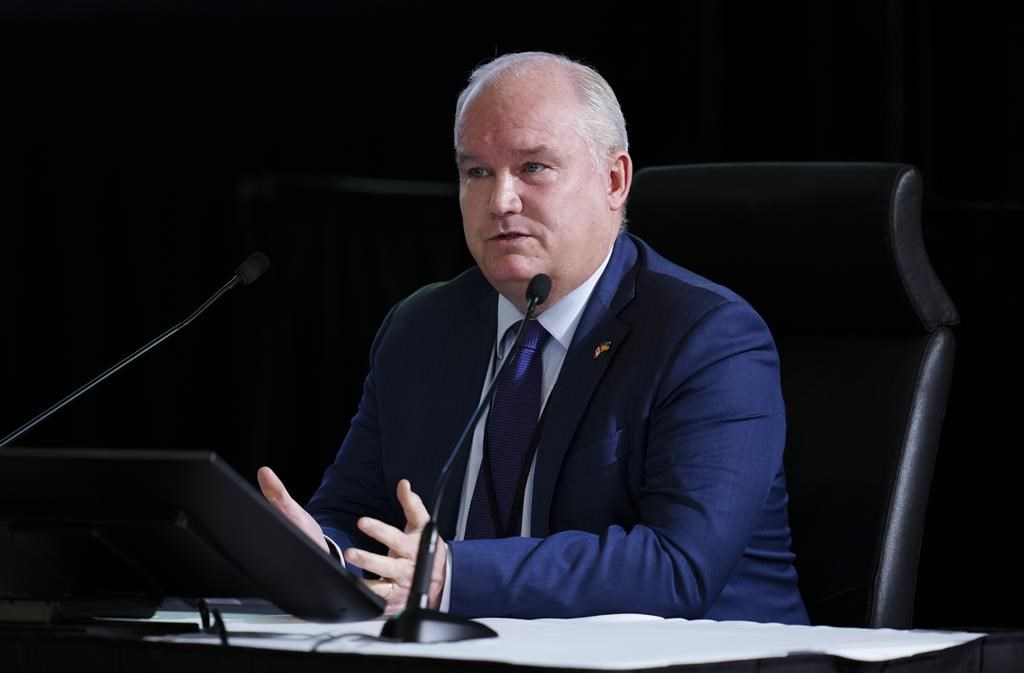
CONSERVATIVES ASK INTERFERENCE INQUIRY JUDGE TO RULE ELECTIONS WERE FLAWED
The Conservative Party of Canada has urged the judge overseeing the Public Inquiry into Foreign Interference to conclude that Prime Minister Justin Trudeau ignored repeated warnings about foreign interference in the last two general elections for partisan gain, the first time the party has formally made such an accusation.
In a separate submission to inquiry Commissioner Marie-Josée Hogue, Conservative MP Michael Chong cautions that there is not yet enough evidence for her to say if the 2019 and 2021 general elections can be considered legitimate. That, too, is the first time an elected Conservative MP has suggested the integrity of the overall outcome of both elections is in doubt.
The submissions from other groups given legal standing at the inquiry make a different argument -- that foreign interference had no effect on the overall outcome or on the outcome of races in individual ridings.
"None of the FI (foreign interference) activities, either individually or when combined, threatened the integrity or impacted the outcome of the 2019 and 2021 elections, whether nationally or at the electoral district level," lawyers for the government of Canada argued in their written submission to Hogue. "This remains true today."
But the written submission from lawyers for the Conservative Party argues that "the Trudeau government has known all too well about the dangers posed by interference" and that Trudeau himself had "personal briefings" on the subject as early as 2017. The lawyers cite documentary evidence presented to the inquiry which included secret memos prepared by CSIS as well as oral testimony given by witnesses at the inquiry to support their argument.
"Prime Minister Trudeau and his government were particularly willing to turn a blind-eye to foreign interference in our democratic processes where it was of assistance to his electoral prospects," the party says in its submission.
The Conservative Party's former leader Erin O'Toole said in his submission to the inquiry that care must be taken in raising allegations of interference "to ensure it is addressed without eroding public trust in our elections." O'Toole, both in his oral testimony to the commission and in his final submission said he does not contest "the ultimate results" of either the 2019 or 2021 election, but he did offer a qualifier in his submission, saying, "Foreign interference efforts undermined the integrity of the electoral process even though it did not change the ultimate election outcome."
Hogue, a judge on the Quebec Court of Appeal, has heard more than two weeks of testimony in public, has taken testimony from other witnesses about classified matters behind closed doors, and has received more than 200 documents. Each individual or group given legal standing at the inquiry then summed up all that evidence in submissions given to her last Friday. The submissions also contain arguments as to which "findings of fact" Hogue ought to make.
Hogue is to publish a report by May 3 in which she will essentially pass judgement on what foreign interference did or did not happen in the last two general elections. She will then submit a final report by the end of the year that will assess the federal government's capacity to detect and deter foreign interference along with recommendations to improve processes to combat foreign interference.
More on Politics
- Ontario premier calls cost of gas ‘absolutely disgusting,’ raises price-gouging concerns
- Former B.C. minister Mike de Jong seeks federal Conservative nomination
- Ottawa ‘doubling down’ on foreign aid amid global decline: minister
One of the key issues for Hogue to adjudicate in that May 3 report is the impact of foreign interference, particularly from China, on the 2019 and 2021 elections.
The Conservative Party, Chong, and O'Toole, in their testimony and submissions, said that both elections were legitimate. But all three -- the Conservative Party and Chong especially -- offered enough conditional qualifiers that they argue Hogue should consider before affirming the integrity of both elections. "Confirming the integrity" of both election is, in fact, one of the chief terms of reference for the inquiry.
The Conservative Party says "the results of both general elections were legitimate" while arguing that the Liberals gained a partisan advantage because the Liberal leader and prime minister failed to combat foreign interference by China that the party argues, had the chief objective of defeating Conservative candidates.
Indeed Chong urges Hogue to make a finding of fact that the People's Republic of China's main target for PRC disinformation in the 2021 general election was the Conservative Party of Canada.
Chong's submission also says, "No one contends that FI (Foreign Interference) changed the outcome of the last two elections" but then his lawyers immediately qualify that statement by saying, "if by 'outcome' one means which party was in a position to form government. But that is too narrow a definition of outcome. In Canada’s parliamentary democracy there can be no such thing as 'rounding-error ridings'. Every riding counts. Nor can the experiences of 'special interest groups' such as diaspora communities be marginalized in favour of 'mainstream' voters."
And near the end of Chong's submission, Hogue is warned that she "is not yet able to make any final determination as to the integrity of [the 2019 election] and [the 2021 election], either nationally or in individual ridings." Chong, through his lawyers, argues that the integrity of both elections remains in doubt until the inquiry can hear more testimony from members of diaspora communities. He also says the inquiry must wait for investigations on election integrity still under way by the all-party National Security and Intelligence Committee of Parliamentarians and by the National Security and Intelligence Review Agency.
2024-04-19T10:39:19Z dg43tfdfdgfd